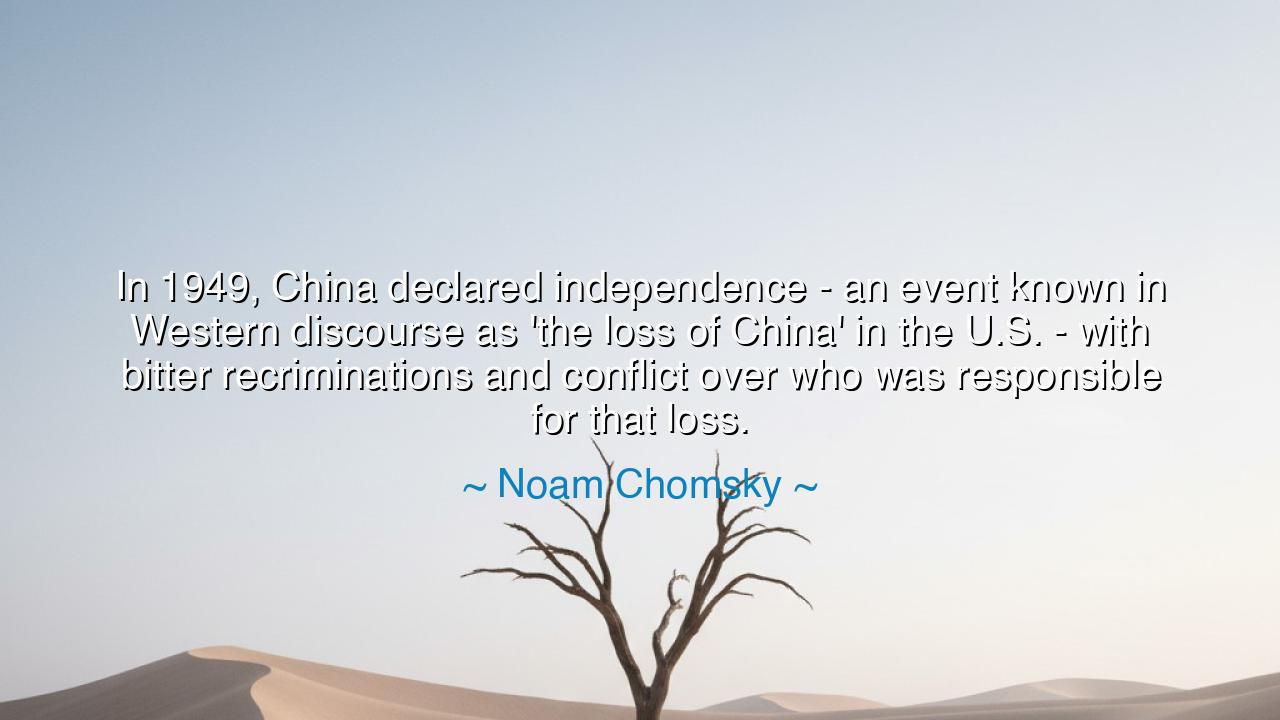
In 1949, China declared independence - an event known in Western
In 1949, China declared independence - an event known in Western discourse as 'the loss of China' in the U.S. - with bitter recriminations and conflict over who was responsible for that loss.






“In 1949, China declared independence — an event known in Western discourse as ‘the loss of China’ in the U.S. — with bitter recriminations and conflict over who was responsible for that loss.” — Noam Chomsky
In these words, Noam Chomsky, the philosopher and chronicler of power, lays bare one of the great ironies of modern history — how the liberation of one people can be mourned as the loss of another’s control. When China declared its independence in 1949, it was not the birth of bondage, but the end of a long humiliation, the conclusion of a century of subjugation beneath foreign powers. And yet, in the halls of Washington, this act of self-determination was mourned as a catastrophe, “the loss of China.” Thus, Chomsky’s words pierce through the veils of politics to expose a universal truth: that the mighty often see freedom as theft — the freedom of others as the loss of their dominion.
The meaning of this quote is both historical and eternal. It speaks to the blindness of empire, which mistakes possession for order and control for virtue. In 1949, when Mao Zedong proclaimed the founding of the People’s Republic of China, it was not the loss of a colony but the reclamation of a civilization. After a hundred years of invasion, exploitation, and civil war, China sought not conquest, but sovereignty. Yet to those who had grown accustomed to commanding its fate, this act of independence appeared as calamity. Thus, Chomsky reminds us that language itself becomes a weapon — that history, when told by the powerful, can transform freedom into “loss” and justice into “defiance.”
To understand the origin of this moment, one must look back to the long night that preceded it — the Century of Humiliation, when China was carved, conquered, and coerced by foreign powers. Its ports were opened by gunboats, its people addicted to opium sold under treaty, its treasures looted in the name of commerce and civilization. When at last, in the aftermath of World War II, the old imperial order collapsed, China was left divided between two forces: one seeking to reclaim its dignity through revolution, the other clinging to the vestiges of Western influence. When the revolution triumphed, the Chinese people declared themselves free — but in the West, it was called a loss, as though a nation could belong to anyone but itself.
Consider this irony: in that same year, 1949, India too had only recently thrown off the yoke of empire. Its independence was hailed as progress, celebrated by the world. Yet China’s was lamented, feared, and condemned. Why? Because India’s path was seen as alignment, and China’s as defiance. Here lies the heart of Chomsky’s reflection — that the powerful do not weep for the suffering of the world, but for the collapse of their control over it. And thus, what should have been recognized as the restoration of dignity was instead framed as a disaster. Such is the tendency of empires: to mourn not the suffering they caused, but the power they lost.
But the deeper wisdom in Chomsky’s words is not limited to nations and empires; it belongs to all who seek freedom in a world that profits from dependence. Whenever an individual, a people, or a nation dares to stand alone — to think, to act, to govern themselves — those who once held sway will call it rebellion, chaos, or loss. The same pattern repeats in every age: the enslaved who break their chains are accused of ingratitude; the colonized who rise are called threats to order. Chomsky’s observation is therefore not only about China’s independence, but about the eternal struggle between those who seek to rule and those who choose to live free.
Think of the Haitian Revolution, when enslaved Africans, led by Toussaint Louverture, overthrew their oppressors and founded the first Black republic. To the colonial powers, this too was a “loss” — the loss of their plantations, their profits, their pride. Yet to the enslaved, it was the beginning of humanity restored. Or recall the Algerian struggle for independence, when France mourned what it called a national tragedy, while Algerians celebrated the end of more than a century of oppression. In every such story, the lesson is clear: freedom for one is never a loss for another, unless the other desired dominion more than justice.
Let this, then, be the teaching drawn from Chomsky’s reflection. Beware of those who call the liberation of others a loss. Question the stories told by the powerful, for their grief often conceals guilt. When a nation, a people, or a soul rises from dependence to dignity, it does not diminish the world — it enriches it. Independence is not theft, but the rightful return of what was always one’s own. So, too, in our own lives: when we free ourselves from the opinions, systems, or influences that enslave us, some will call it loss — but it is the beginning of truth.
And so, as the ancients would say, let freedom be understood not as rebellion, but as restoration. The rise of a people from subjugation to self-rule is never a tragedy — it is the triumph of life over domination, of dignity over despair. Chomsky’s words echo through time to remind us that those who lament the freedom of others reveal their own enslavement to power. Therefore, let us rejoice when the chains fall, whether of nations or of hearts, and remember that every act of independence — though mourned by the mighty — is celebrated by the just.






AAdministratorAdministrator
Welcome, honored guests. Please leave a comment, we will respond soon